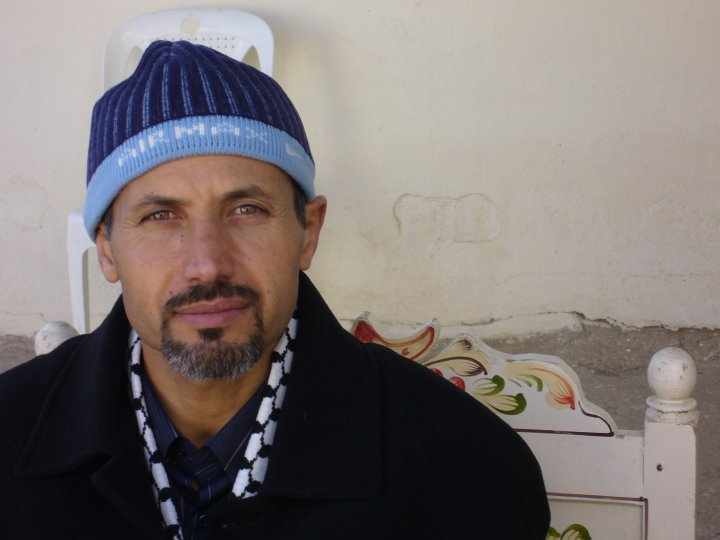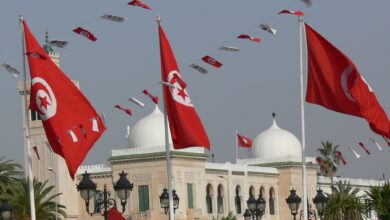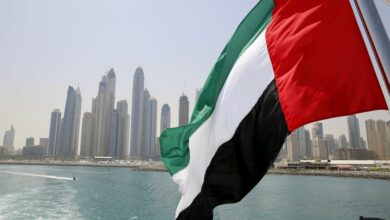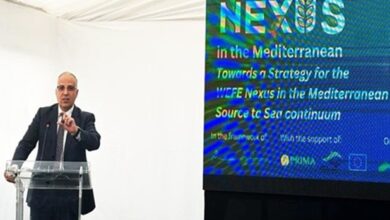
TUNIS — Ajmi Lourimi, a member of Ennahda’s highest decision-making body, stands out as one of the most moderate voices in Tunisia’s largest Islamist organization. The 50-year-old political leader spoke to Egypt Independent last month, a day after the closing ceremony of his group’s first public convention since the revolution. The Ennahda Shura Council member denied any ideological or generational conflicts within his party, affirmed his group’s commitment to democracy and pointed out differences between Tunisian Islamists and their Egyptian counterparts.
Egypt Independent: In light of the latest convention, what is happening within Ennahda?
Ajmi Lourimi: The convention ended its activities with the reelection of Sheikh Rachid Ghannouchi as president of the movement. In our tradition, nobody nominates oneself, but someone else shall nominate him. Almost 30 were nominated but nearly 18 had withdrawn before the poll. The convention also elected 100 members of the Shura Council. They constitute two-thirds of the Shura Council and they will be electing the remaining one-third. In the [complementary] elections, all the problems in the first election will be taken into consideration.
The electoral process cannot be idealistic. Some segments or provinces may end up not being represented. This is why we will strive to add a third that ensures a balanced and comprehensive Shura Council.
EI: What segments are under-represented?
Lourimi: I will give you an example. We have 100 members that include only five women. This is a small percentage and we are thinking about raising it to 20 or 30 percent, which means the remaining third shall include women. Also the percentage of youth under 25 was less than we expected. Some geographic areas are not represented either. Nobody from Sidi Bouzid, where the revolution began, made it to the Shura Council as far as I know.
EI: What are the functions of the Shura Council?
Lourimi: The Shura Council is similar to the central committee in other political parties. It lays out policies, ratifies decisions of the executive bureau and holds the latter to account. It represents the legislative authority; it is more like a parliament.
EI: There is so much talk about an internal conflict between leaders who lived in the diaspora and those who stayed at home [under former President Zine al-Abidine Ben Ali]. How true is that?
Lourimi: This is not accurate. We had at the convention people who were exiled and came home after the revolution and people who were jailed for years here, and I myself belong to the latter group. I was jailed for 17 years and three months. One year under [former President Habib] Bourguiba and 16 years and three months non-intermittently under Ben Ali. You cannot speak of one bloc of Ennahda members who lived in the diaspora versus another bloc that was jailed at home. We have a lot of affection for each other and some of us are even related. It is not true that there is a solid diaspora or home bloc.
EI: If untrue, why is this issue raised?
Lourimi: It is the media…But this does not mean that the movement is homogenous and bears no differences. That would be abnormal. There shall be diversity within a movement that is [several] decades old and whose members have had different experiences. Of course, the experience of someone who lived in the countryside is not the same as someone who lived in the US, Australia or London. But we are like a family where the father has been accustomed to certain things but the son has traveled and had his own adventures. So there is diversity within the movement, but there is no generational conflict within the movement. The image of hawks and doves that is being circulated is not true either. I am not trying to window-dress, but that reading is not correct.
EI: How do you define the Ennahda movement after the revolution?
Lourimi: Ennahda is a modern party in terms of its structure, mode of operation and discourse. In the meantime, it is bigger than just the party. It is also a cultural, proselytizing and social movement. We do not have two separate entities. The movement had taken the party format but this format cannot cover all the movement’s activities. We are discussing now the relationship between the proselytizing and the political. We are looking into the experiences [of other Islamists groups] in Egypt, Jordan, Morocco and Yemen.
EI: Why did you postpone the discussion of this matter to the next convention although it is getting a lot of attention from many forces in society?
Lourimi: It was not postponed. We just left it to the next convention. We are discussing the matter and we have already prepared a number of papers on that; we just need a deeper discussion. And actually, we are practicing some [separation between the proselytizing and the political]. Our leading structures do not have preachers and we did not nominate any preachers [to the National Constituent Assembly]. We asked those who wanted to run for the NCA to resign from preaching first. This is a kind of separation. We do not want preachers to be part of partisan conflicts. As political leaders, we abstain from giving religious lessons in mosques for fear that we would be seen as using [mosques] for political campaigning. However, few people [are still preaching], namely Sadeq Chourou and Habib al-Louz.
However, there is a demand that Ennahda reinforces its presence [in mosques]. It is required to spread moderate Islam especially as Salafi youths have been trying to impose a certain version of religiosity that people are not accustomed to in some mosques. We find ourselves forced to intervene to prevent divisions among worshippers.
EI: Do Salafis constitute a burden on Ennahda?
Lourimi: We perceive Salafis as inexperienced youths. We might have passed throughout a similar phase in the late 1960s or 1970s. For these youths, Islam is not just about personal piety but it requires ensuring that others are as pious. We agree with them on some creedal matters but we differ on other matters, and we believe that their behaviors bear a lot of despotism.
EI: What are the similarities between Egypt and Tunisia in terms of the secular-Islamist conflict?
Lourimi: The revolution took everybody by surprise. Although Islamists were always chased, they seemed the most prepared to interact with new developments. This made them capable of benefiting more than others. Ahead of the elections, all parties focused on weakening Ennahda’s chances. However, there was a general trend [among the people] to vote for Islamists. Now, losers have a vested interest in halting and failing the process by all means, even if that would entail the destruction of the state. The acts of some secularists are driven by their loss in the elections.
The country does not need any ideological polarization. We do not need to divide the Tunisian society. We have made a lot of gains that we can build on. We have already agreed that our identity is Arab and Islamist and there is an agreement on the implementation of the first article of the 1959 Constitution, which says that Tunisia is an independent and sovereign state, Islam is its religion, Arabic is its language and its regime is republican. There is also an agreement on the respect of individual liberties. Hence a girl shall be able to wear or not wear the veil. We suffered from the ban of the veil by force so we should not impose it by force either … we agreed on peaceful alternation of power and to let ballot boxes decide [who would govern]. These are principles that can serve as a framework for coexistence.
Those who divide the society between modernists and conservatives or secularists and Islamists want to take us back to the days that preceded the revolution when polarization was used to crush people’s liberties. There is no need now to Islamize or secularize the society but rather to democratize it. The society is already Muslim and what bothered it in the past was being prevented from practicing religious rituals freely.
EI: The Constitution is expected to be completed by 23 October. Where does it stand so far?
Lourimi: The committees are at an advanced phase. In only a few days, [NAC] members will go on a summer recess for a few weeks but before that they will conclude their work. As soon as they go back to work, deliberations will begin in general sessions, and we hope to finish the Constitution by the end of October. But it might be hard [to meet that deadline].
EI: Why is it hard?
Lourimi: Each article will be discussed separately. If the opposition and the majority cooperate, it will be possible to finish it, but if one party insists on halting the matter it will be hard to reach a Constitution that pleases all by that date.
EI: What are the main points of contention?
Lourimi: There may be contention over the type of the political system, be it presidential or parliamentary. Also gender equality and how each party perceives it. Some are demanding equality in inheritance. We cannot go beyond the ceiling of certain matters that are clear [in Islam] … we already believe that the inheritance system in Islam achieves equality between men and women. Those demanding that women get as much as men do not understand the Islamic inheritance system quite well.
There is also the first article of the Constitution. Some want to include Sharia as a source or as the sole source of legislation. We have already surpassed that but some groups may raise it again.
EI: How would you compare your organization with the Muslim Brotherhood in Egypt?
Lourimi: Intellectually, we belong to the same school of thought but we came up with our school later on. The Brothers perceive themselves as the center of Egyptian society and as the axis of political life, and they do not see a big plus in opening up to others or working with others. However, we have opened up to others and we were never introvert.
The Muslim Brotherhood remains a large school but any diversity within the group takes the form of a generational conflict. We do not have that. The Muslim Brotherhood has more internal discipline than us. The minute someone walks out of the group even if he is one of the leaders, he is targeted and besieged. We do not have that.
For the Brothers, the organization and the leaders cannot be challenged. But our leaders live among the people and can be held accountable and challenged. For us, the organization is functional rather than sacred … we don’t fear ideological penetration of the organization, and we do not feel worried about any potential deviation from the fundamentals of [the Islamist] school. We interact with realities and we have the ability to digest new ideas.




